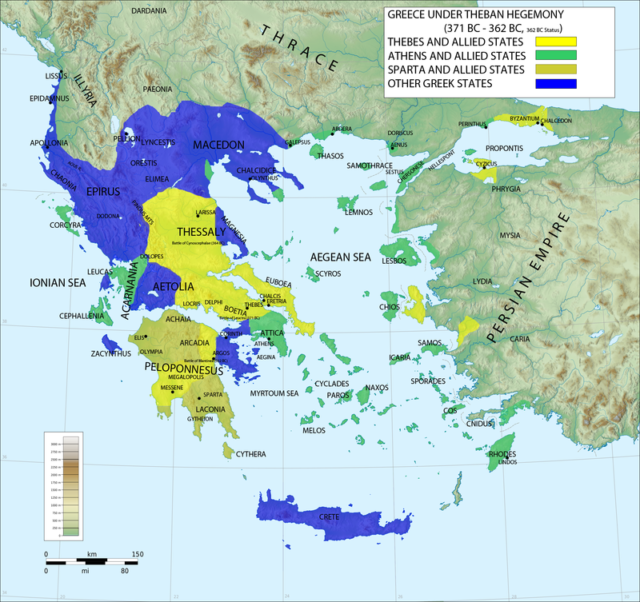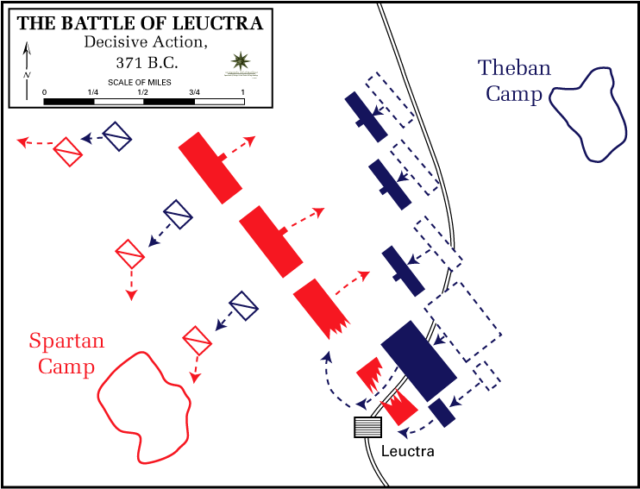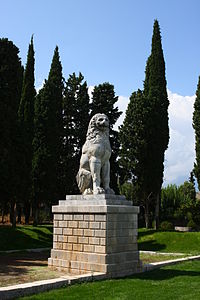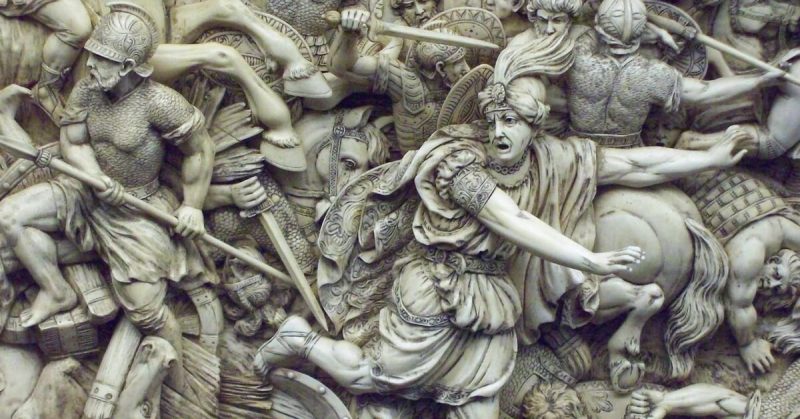Philip of Macedon conquered the Greeks, most of us know that, but how did he do it? These mighty Greeks faced huge numbers of Persian invaders and won despite the most terrible of odds. Why was Philip able to march in and defeat a larger combined Greek army and essentially win Greece in one major battle?
Well, there are two main reasons for Philip’s victory. The one that best known is that the professional army of Philip was just too well disciplined, led, and equipped for most armies to stand against. The other reason was that the Greeks literally killed off all of their best warriors by fighting each other to a degree not seen before the Persian invasions.
The Peloponnesian War, in a way, contributed to the decline. Many thousands of soldiers were killed, and huge amounts of money were put into ships that would eventually be sunk in one battle or another. Even with the financial and population strain, the war ended over a generation before Philip’s battle of Chaeronea. So really the Greeks still had a chance to rebuild their united strength.
Unfortunately for the Greeks, the Spartans just couldn’t hold power after finally triumphing over Athens. Thebes, under the master tactician Epaminondas, crushed the Spartans best at the battle of Leuctra. Other warfare chipped away at the Spartan forces less than a generation before Philip arrived. The Greek city-states simply didn’t have the populations to support such continued warfare.
The decisive blow to Greek power would come when the Theban Hegemony fought against other combined Greek forces led by Athens and Sparta at Mantinea. Thousands of good Greek hoplites and one exceptional commander were lost in a single day, leaving the door wide open for any competent conqueror.

Mantinea was fought when Greece was in one of its most complicated divisions of leagues, spheres of influences, and empires. The Thebans enjoyed a large empire stemming from their victory at Leuctra. Their empire stretched from Thessaly about bordering Macedon and stretched as far as Attica, with strips of land and cities in the Peloponnese.
Athens still had many islands and united with the old rival, Sparta. The Spartans were gaining more control over the Peloponnese which prompted a Theban march south to solidify their control over the always dangerous Spartans.
Epaminondas brought two of his protégés with him to the battle. Daiphantus and Iolaidas were along as officers and the aging Epaminondas had high hopes for them to take the torch and lead the future Theban Empire. With the Thebans were allies from all over Greece, Tegea, and Plataea and many other places.
The battle was fought at Mantinea because the Peloponnesian city-state decided to pull away from its Theban ties. They received immediate support from the Spartans and some surrounding powers. They got a mildly surprising support from Athens, a former enemy.
This was because the Athenians remembered that their city was spared from destruction at the end of the Peloponnesian War. Thebes strongly advocated for the city’s destruction but Sparta refused. The rising power of Thebes gave Athens and Sparta common cause for the first time in generations.

When the combined forces met, their forces seemed to be roughly equal, though the Thebans had the master strategist in Epaminondas. Epaminondas created an echelon formation with a heavy driving force to kick off the attack. With the main infantry battle in an otherwise standard line, Epaminondas had his light infantry combine with his cavalry to drive the Athenian cavalry from the field.
At the same time, he had some of his hoplites march across his formation to crash into the flank of the Mantineans. The Mantinean commander was killed, and the rest ran back to their city. The echelon formation easily won the day on the rest of the field and though it was a tough fight, the Theban’s and their allies won decisively.
The battle turned into a terribly Pyrrhic victory when Epaminondas was fatally wounded. The general and statesman had, almost single-handedly, brought about the Theban Hegemony. The Theban army was intact, but without a leader.
Epaminondas soon learned that his two commanders that he had hoped would replace him, Daiphantus and Iolaidas, were also fatally wounded in the battle. Epaminondas told his subordinates to settle for peace, knowing that the Thebans had a fragile grip on their empire.
Less than a decade later the Greeks became involved in what would be known as the Third Sacred War. This ten-year war was fought between the already war-torn old powers of Greece. The various powers fought bitter battles, and nobody was gaining the advantage. Finally, the Thebans allied with the rising power of Philip of Macedon who came in with some force and instigated a peace settlement.
This latest great battle took a heavy toll on the Greeks. The Athenians were really running out of quality soldiers and the Thebans were without a few great commanders. 24 years after Mantinea and eight years after the Third Sacred War, Philip of Macedon would come marching south with a well-trained army.

His multifaceted army of a phalanx with elite skirmishers and cavalry would decimate the Greeks at Chaeronea, and they were far too exhausted to fight with the same vigor and manpower as they did against the Persians.
Philip did not approach the Spartans, but even so, the Spartans were too weak to march out with any real force, leaving Philip as overseer of Greece, passing down this privilege to his son Alexander.
